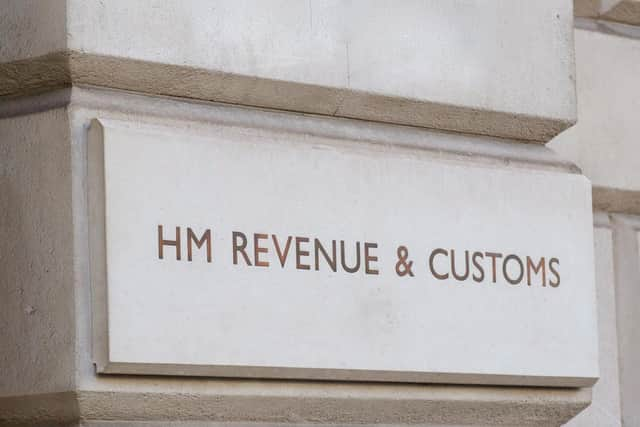HMRC pledges to raise standard of conduct among tax advisers following loan charge review
The review into the loan charge criticised the conduct of promoters and professional advisers who are continuing to sell loan schemes, despite knowing they will not deliver the tax benefits promised.
Sir Amyas Morse found that the tactics used by promoters included misrepresenting the DOTAS (disclosure of tax avoidance schemes) system to claim that schemes had been approved by HMRC, or providing opinions from Queen’s Counsel suggesting that HMRC would be unsuccessful if they tried to claim the tax.
Advertisement
Hide AdAdvertisement
Hide AdSir Amyas’ review added: “While the review has set out its position that responsibility for tax affairs must ultimately rest with the individual, it is to be expected that people will want expert advice on their tax affairs, and will turn to professionals for that advice.


“The review considers that the continuing marketing of loan schemes on the basis of tax benefits associated with them, given the clear legal position, is reprehensible.”
The independent review of the loan charge recommended the Government should improve the market in tax advice, including considering formal regulation, which HMRC has accepted.
HMRC has launched a consultation process as the first part of its drive to put this recommendation into action.
Advertisement
Hide AdAdvertisement
Hide AdA HMRC spokesman added: “The call for evidence is open to the public and we are particularly interested in hearing from anyone who provides or receives tax advice or services.
“The aim is to gather evidence, expertise and opinions on improving standards which will help us decide the best way forward on this matter.
“We will be giving thorough consideration to the evidence presented to us, which will help us assess the range of options for improving standards.
The spokesperson said: “We are seeking views on what can be done to raise the standards, ethics and behaviours of those who provide tax advice and services.
Advertisement
Hide AdAdvertisement
Hide Ad“We recognise that the majority of people who provide tax advice are professional and provide valuable support to taxpayers, which also benefits HMRC.
He added: “We also know that some tax advisers do not act professionally.
“This may be because they’re not qualified or lack expertise, and for some it’s deliberate dishonesty, such as knowingly promoting tax avoidance schemes and misleading their clients.
“Bad advice is not only harmful to the tax system, it damages taxpayers who often find they have no effective remedy against it.”
Advertisement
Hide AdAdvertisement
Hide AdThe spokesman said HMRC wanted taxpayers to be protected and to feel assured that the tax advice they receive is reliable and accurate.
Last year. the Government said it planned to implement changes to the loan charge, after the review found that it caused “serious distress” to some of the people affected by it.
To provide evidence to the HMRC visit https://www.gov.uk/government/consultations/call-for-evidence-raising-standards-in-the-tax-advice-market.
You can also contact HMRC by emailing [email protected].
Advertisement
Hide AdAdvertisement
Hide AdThose hit by the loan charge are not “city slickers and international bankers”, but doctors, nurses, and those who work in social care, David Davis MP told the Commons earlier this month,
Speaking in a Commons debate on the saga, the Haltemprice and Howden Conservative MP - who has been a strident campaigner against the charge- said it was an issue of “natural justice”.
Mr Davis outlined how many court cases had been unable to decipher the rules surrounding the schemes, and said: “So if the judges can’t understand it, what chance ordinary layman? People who cannot afford to employ an accountant.
“We're not talking about city slickers here or international bankers, we're talking about locum nurses, social workers, care workers and hospital cleaners.”
Advertisement
Hide AdAdvertisement
Hide AdLast December, the Government accepted a number of recommendations in a report by senior auditor Sir Amyas Morse and agreed to reduce the tax bill of 30,000 people caught up in the loan charge.
But MPs urged further actions as they believed the law on the loan charge was not settled until 2017.
Mr Davis said instead of chasing individuals HMRC should instead be going after the advisers who pushed the schemes.
Mr Davis said: “These people are now suffering because of a history of poorly drafted regulation and legislation and poor management at HMRC targeted on the wrong people.”
Advertisement
Hide AdAdvertisement
Hide AdFinancial Secretary to the Treasury Jesse Norman said: “I want to put on record again that I and my colleagues recognise the strength of feelings involved, as I've said, and very much sympathise with those who may be subject to the charge.”
But he said the schemes discussed were “contrived tax avoidance in which people were paid in the form of loans with no interest and no intention or requirement to pay the loan back”.
Comment Guidelines
National World encourages reader discussion on our stories. User feedback, insights and back-and-forth exchanges add a rich layer of context to reporting. Please review our Community Guidelines before commenting.